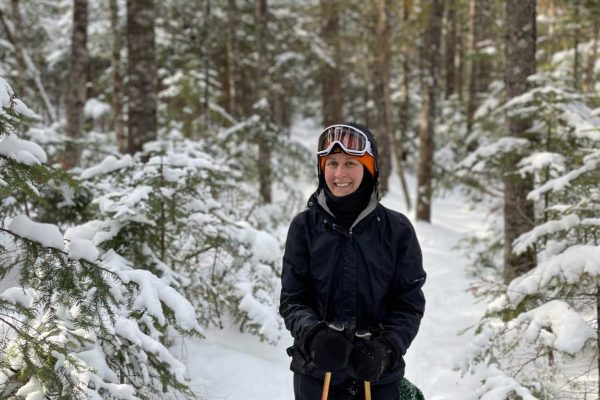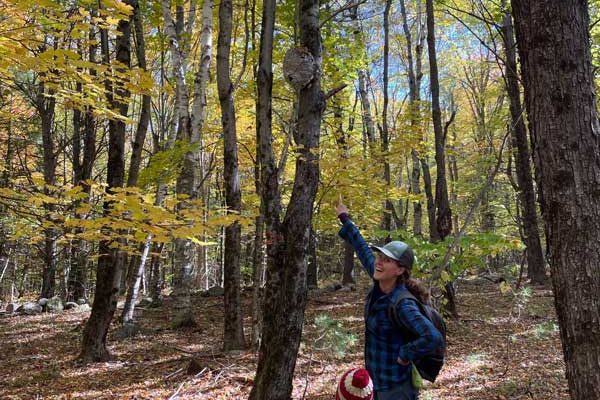Have you ever found yourself out in the woods and noticed a deep sense of feeling fully present in your body, the moment, and your surroundings?
Some examples include: your heart beating in your ears, hands and legs scraping against rock, as you pull yourself over the crux, followed by a whisper of gratitude to your trusty harness and rope, maybe even a kiss of relief up to the heavens; the soft snore of your baby asleep on your back as you steadily meander along the path, a deep release of your shoulders celebrating a successful nap walk; the jingle of your best bud’s tags as they swoop past your legs, screech to a halt, tail sweeping the leaves as a dangling tongue awaits a treat as reward for a swift return; giggles of a married couple and the scrape of skis across a frozen pond, sinking into a kid-free weekend for the first time in forever, the loudest words between them the unspoken understanding that they can’t wait to do this again, but next time with their kid; the soft song of the trailside stream, the tinkle of water-over-rocks time warping you back to sitting in a rubber raft smack in the middle of a class IV rapid and the jitters over what lies ahead.

The author can’t stop smiling over the ski conditions on a trail in the woods of Northern Maine.
I like to refer to this as the ASMR of forest bathing.
What is ASMR? The dictionary states ASMR “refers to a tingling sensation often accompanied by a calming, pleasurable feeling. This tingle is said to originate in a person’s head and spread to the spine (and sometimes the limbs) in response to triggering audio or visual stimulation.”
According to healthline.com, ASMR provides immediate pleasure, improved mood, pain relief, deeper concentration, and better sleep. Kind of sounds like all the benefits of spending time in nature to me. “People who enjoy ASMR often report reduced anxiety, fewer headaches, lower blood pressure, and more. While these are in line with what has been proven, more research is needed to back up these claims.” Again, are we talking about time immersed in nature here?
And what about forest bathing? In 1982, the Japanese Ministry of Agriculture, Forestry, and Fisheries created the term shinrin-yoku, which translates to “forest bathing” or “absorbing the forest atmosphere.” The practice encourages people to simply spend time in nature — no actual bathing required. An article from the National Library of Medicine states “studies have found that [forest bathing] has positive physiological effects, such as blood pressure reduction, improvement of autonomic and immune functions, as well as psychological effects of alleviating depression and improving mental health.

You never know who you may run into out in the woods. Best to just stick to the trail and leave the local wasps to their own devices…
As of 2021, 33% of Mainers were clinically diagnosed with high blood pressure. As of 2006, 7.6% of Mainers reported moderate to severe depression (who knows what that number has jumped to 17 years and one pandemic later). With more accessible trails available throughout the state for Mainers with a full range of capabilities, perhaps that high blood pressure number will decrease as people’s happiness increases: two benefits of both ASMR and forest bathing. Best of both worlds?
So where does the Natural Resources Council of Maine come in? In this legislative session, we are supporting a $30 million trails bond that would provide grants to nonprofits, municipalities, and other divisions of government statewide to support non-motorized, motorized, and multi-use trails. This bond would provide easier access to and more choices for trails all across Maine. Sounds to me like opportunities for forest bathing and the ASMR benefits that go along with that practice will grow exponentially. If we can all get behind this bond, these trails stand to improve our community, our health, and our overall quality of life — just what the doctor ordered.
— by Ari O’Neill, NRCM Rising Leadership Team
[Header photo credit: Mainely Casey]











I’m so excited to see the interest in “forest bathing”. As a retired teacher who has worked with many students with behavioral and other related issues I believe that immersion in nature could and should be part of the educational program. Knowing that others believe similarly is invigorating.